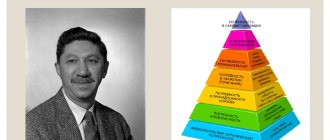Greetings, friends!
Reflection is a special quality inherent in human nature. It is not characteristic of animals and is present only in humans. Thanks to it, we are able to evaluate and rethink our own actions. Unfortunately, reflection often has too strong an impact on our mood. We tend to think about irrelevant events, spending a lot of time and emotional energy on it. In this article we will talk about what reflection is, how it manifests itself, and how to learn to use reflection to your advantage. So,
What is reflection?
In psychology, reflection is the ability of a person to evaluate himself as a unique individual within the society of which he is a part. It includes many aspects, such as awareness of one’s own purpose, assessment of one’s moral and moral qualities, and rethinking of actions.
Philosopher and anthropologist Pierre Teilhard de Chardin said that reflection implies not only the presence of certain knowledge, but also the ability to analyze and evaluate the level of this knowledge. By reflecting, a person tries to look at himself from the outside. He evaluates how adequate, moral and moral his behavior appears to others.
Reflection also implies internal self-knowledge, awareness of one’s own uniqueness, search for purpose, and the desire to determine one’s value to the world. This is an important mechanism for personality formation, determining behavioral patterns. It affects perception, reaction to surrounding events, decision-making and other individual aspects of human behavior.
Definition of concepts
Reflection is a human skill that consists of introspection and self-awareness of one’s activities, one’s behavior, and also actions.
During reflection, the above-mentioned actions are analyzed and evaluated. What is reflection? In simple words, we can say that a person looks inside himself and reviews all his personal qualities and behavior in a particular environment. Realizes the correctness or incorrectness of actions.
Self-reflection , on the other hand, is like looking in a mirror and describing what you see. It's a way to evaluate yourself, your working methods and how you learn. Simply put, “reflection” means to think about something. Reflecting and composing a piece of self-reflective writing is becoming an increasingly important element of any form of awareness or learning.
How does reflection manifest itself?
Reflection helps a person understand how he looks from the outside, therefore it is one of the most important mechanisms of personal development . Under its influence, a person engages in self-analysis, forms desired habits, and learns to better understand the connection between his actions and the events that follow them. This ensures the development of one of the most important components of our intelligence - the ability to foresee the consequences of our own actions.
Influencing our perception, reflection performs such functions as:
- getting rid of destructive and simply unwanted thoughts;
- formation of logical thinking;
- improved control over one’s own thoughts and actions;
- understanding your own advantages and disadvantages;
- development of self-criticism;
- developing the ability to see the relationship between actions and consequences;
- planning training;
- finding solutions to complex problems;
- finding hidden talents and abilities.
All of the above points are positive, but reflection is not always beneficial. Excessive thinking about one’s own mistakes causes a person to waste a lot of emotional energy, and this is not the worst consequence of self-examination. Therefore, it is important to learn to reflect moderately and consciously, without causing damage to your own psyche.
Why is reflection needed?
Trying to define what reflection is, scientists came to the conclusion that its most important function is self-knowledge. By contacting the outside world, observing people’s reactions to their own actions and comparing their behavior with his own, a person forms a set of requirements for himself - a kind of set of rules that he strives to adhere to.
Reflection is necessary in order to accumulate life experience and respond to external events not affectively, but in a balanced and deliberate manner. A person constantly monitors his mood and well-being, tracking the emergence of certain emotions in time, dealing with them and consciously selecting the most adequate response option.
In some situations, a person has to turn to a psychotherapist to understand how he developed certain feelings. A developed ability to reflect makes it possible to understand such things independently. It significantly improves understanding of cause-and-effect relationships and time dependencies. For most people, this understanding is determined by emotions, so quite often it turns out to be wrong.
A person with a developed ability to reflect can draw knowledge from all events that occur. He learns to better understand his own inner world, discovers new features of his character, discovers hidden talents, abilities and predispositions.
But sometimes self-analysis can cause sharp negative emotions. If a person perceives his own mistakes too painfully, reflection can provoke the development of complexes and other problems with his mental state. In this case, it is recommended to consult a psychotherapist who will help you take control of reflection and get rid of its negative manifestations.
How to get out of endless soul-searching and wash productively
In psychology, self-reflection is a powerful way to develop as individuals and make yourself better. Transform the world around you through your own activities, achieve success in life.
All this, of course, is good, but why do people have so many psychological problems? Good question. The fact is that self-reflection, a productive and useful process, is often confused with soul-searching. This is the main problem.
Why does a person slip into tearful “pity” for himself or harsh self-flagellation instead of useful activity?
It is worth considering the causes and methods of dealing with them:
Lack of attention and care in childhood
As a rule, if a child has not received enough love and attention, he feels abandoned and lonely, useless to anyone. This feeling of deep inferiority and some kind of inferiority accompanies the sufferer throughout his life. Does not allow you to look at yourself objectively. Meanwhile, objectivity is the key to self-reflection and self-understanding. Distortions concern everything from abilities to one’s own potential. It is clear that a person who feels insignificant is not able to think productively.
How to cope: without deep psychological study of the situation, it will not be possible to eliminate the feeling of one’s own uselessness. This is an inferiority complex that takes years to be treated for. Still, you can do something on your own. A combination of two methods works great:
- Self-hypnosis. Every day you need to speak well about yourself. Affirmations and auto-trainings allow you to believe in yourself. Look for something to be proud of. Even if not global achievements.
- The second way is to set goals and achieve them. Small ones. I'm lazy - force yourself to do what you don't want and so on.
Psychological violence in childhood
Creates approximately the same situation. If not more severe. Because the child is initially forced to think, to realize that he is nothing. In some cases, this is much more dangerous than physical violence. If the psyche is mobile and vulnerable, the same effect occurs in adulthood. An eternally dissatisfied husband, a grumpy, hysterical wife, close people who should provide support, but do the opposite.
The “treatment” method is approximately the same. However, you must definitely get rid of the toxic environment. Get away from him as far as possible so that nothing interferes with coping with psychological problems. Only then can we talk about effective self-reflection.
Inability to organize yourself
Inherent in people with certain personal characteristics. For example, schizoids, hysterics, narcissistic personalities. In this case, self-reflection is fragmentary and incomplete. When a free minute is given, such people slip from thought to thought, and as a result do not work through and do not realize any quality or habit. A nasty feeling of inferiority may appear, but less frequently than in previous described cases. Plus, it doesn’t have that durability, it doesn’t define life.
How to cope. To reflect effectively, you need to purposefully organize yourself. You need to set aside 10 minutes a day for purposeful reflection on what happened during the day. It is advisable to make a list of several questions. For example: how was your day? What did I manage to do? What did I like about myself? What's not? And so on. Gradually you can and should increase the time to 30-40 minutes. The main thing is not to overwork, otherwise the process will turn into fruitless soul-searching.
Communication problems, deep introversion
The inability to build social connections and communicate with others develops as a secondary process. An introvert doesn't really need this. Often such people know how to reflect correctly, but do it in a negative way. That is, they always look for shortcomings in themselves, but again they do not strive to really work through the situation. I don't know how to communicate. Yes? Well, let. It would be worth quitting smoking. But they still smoke and nothing happens. My speech is unclear, I need to work on my diction. But I don’t communicate much, I don’t really need it. Hundreds of examples can be given. Negative self-reflection does not lead to results.
Treatment. You can cope with the situation if you organize the processes of comprehension. You need to ask the right questions. People with a high level of self-reflection tend to slip into self-deception. Therefore, it is important to structure your actions. You need to ask yourself four questions a day. What do I think about the past day? What did I like about myself, what did I do right? What do you think I did wrong? How will I act tomorrow? Gradually the list can be expanded. The main thing is that thoughts, actions, feelings, and habits are involved in comprehension.
Tendency to perfectionism
A person’s ability for self-reflection plays a cruel joke in the case of perfectionist individuals. Such “patients” suffer from the ability to reflect and immediately fall into self-examination, looking for shortcomings in themselves. Also, the desire for imaginary perfection does not allow action, and this is the worst thing. Today I failed the task, which means I will never succeed. Therefore, I will never do this. Although this option is not always available. Sometimes a person takes on it with even greater zeal, but this happens rarely and does not bring any benefit to the cause. Quite the contrary. It creates unnecessary psychological stress and does not allow you to work productively.
What to do? You need to understand a simple truth. The ideal that a perfectionist strives for does not exist. Mistakes are a normal part of the learning process and an integral part of practice. It is these, and not failure, that need to be recognized and worked through so that this does not happen in the future. Since we are talking about a personality type, a special character trait, it will not be possible to completely cope with perfectionism. The help of a psychologist is needed to understand what is said above.
Personality characteristics. Narcissistic warehouse
In this case, it’s less about self-examination and more about self-pity. The need for self-affirmation and self-reflection is higher among narcissists than among other types of individuals. Because they need recognition, they often behave illogically, which causes mistakes. And mistakes are ideal ground for self-flagellation. Narcissists slide into it, at the same time feeling sorry for themselves. With pronounced accentuation, the process turns into a show, everyone sees and hears what the narcissist is thinking about.
Treatment. It is necessary to structure the process of self-reflection. It's not that hard to do. Ask yourself the same 4 questions at the end of the day. Then, as needed, the list can be expanded. The most severe narcissistic traits can be eliminated under the supervision of a psychologist. Self-control does not always work, especially in the case of such sensual personalities as hysterics and narcissists.
All of the above reasons can be corrected. It all depends on the desire and willingness to work on yourself.
Forms and types of reflection
As we have already found out, reflection is a complex process that can lead to both development and destruction of personality. To better understand why this happens, let's consider the main forms of reflection that psychology identifies. There are several approaches to classification.
Based on the type of influence on a person, there are two types of reflection:
- Constructive self-reflection
. This form of reflection helps to better understand your own inner world, adjust behavior, avoid repeating mistakes and discover new abilities in yourself. - Destructive self-analysis
. This form of reflection is often called “soul-searching,” meaning meaningless worries about old mistakes. A person becomes fixated on the problem, constantly increasing his feelings of guilt, feeling helpless and hopeless.
Based on the time of the events being comprehended, there are 3 types of reflection:
- Situational
. Analysis of a problem that is relevant at the moment. - Retrospective
. Understanding events from the past. - Promising
. Planning actions, assessing the likelihood of success and predicting possible mistakes.
Depending on the object being comprehended, there are 4 types of reflection:
- Self-reflection
. Understanding your own inner world, experiences and emotions. - Communicative
. Analysis of interaction with surrounding people. - Sanogenic
. Understanding your own emotions in order to take control of them in order to minimize meaningless mental suffering. - Intelligent
. Thinking about existing and necessary knowledge, searching for opportunities for its practical application.
Having a good understanding of what reflection is and how it works, you can learn to manage its various forms. Correct combination and combination of these forms allows you to achieve the best results in self-knowledge. It is important to consider that different combinations need to be used for different situations.
Reflexivity
Within the framework of the reflexive-humanistic approach, the mechanism of reflection is understood as the comprehension and rethinking of thinking stereotypes and their heuristic overtones to the extent that it creates new (creative-innovative) content of thinking.
Within the framework of this approach, the main reflexive psychological terms are considered: reflexivity, reflexive ability, reflexive readiness and reflexive competence.
Reflexivity is a characteristic of personality types, value orientations, ways of life, distinctive features of people’s communication and interaction, during which reflection develops.
Reflective ability is the ability of a subject (individual or group) to reflect on various types and areas of their activity, that is, the ability to give a reflective quality to any process (including the process of network therapy) and functional structure.
The readiness to actualize and implement reflexive ability is called reflective readiness, which allows reflexivity to be included in the existing conditions of a person or any other system.
Reflexive competence is a professional characteristic of an individual that allows for the implementation of reflexive processes and the effective and adequate implementation of reflexive abilities. This encourages creativity and ensures maximum process efficiency.
Reflective competence is a complex entity. The subject of reflection can be an individual: knowledge about the role structure and positional organization of collective interaction; ideas about the inner world of another person and the reasons for his actions; own actions, behavior and images of oneself as an individual.
It is important to clarify those perspectives for the interpretation of reflection that allow the psychotherapist to optimize the reflexive competence of pedagogical, parental, children's and other associations in crisis situations.
How to use reflection to your advantage?
Any skill develops effectively only with regular use. To develop reflection, you need to practice it regularly. There are several exercises that will allow you to do this as consciously as possible:
1. Be aware of current feelings
. This is a useful habit that should be applied whenever there is a change in environment. Did you feel that your emotional state had changed? Listen to your feelings, try to understand what you feel at the moment, what worries you. Quite often, non-obvious things are discovered.
2. Highlight the situations to which you react most painfully
. Understanding which events trigger strong emotional reactions can help you identify problem areas and target them.
3. Learn to intentionally stop self-searching
. In most cases, self-digging does not bring any benefit, but only worsens your mood and reduces productivity. Fortunately, this process can be controlled intentionally. Just tell yourself that you will think about it later, but now you need to get busy.
4. Don't try to control everything
. It is impossible to control everything; some things are truly better left to chance. Allow surprises to happen from time to time, and focus on controlling the most important aspects of life.
5. In the evenings, reflect on your day
. This is a healthy habit that many successful people practice. Just think about what made this day remarkable, what useful things were done and what mistakes were made.
6. Think in detail about everything that interests you
. Choose any subject that interests you and think about its nature. Thanks to interest, this process will be uncomplicated and enjoyable, while you will develop deep analysis skills.









